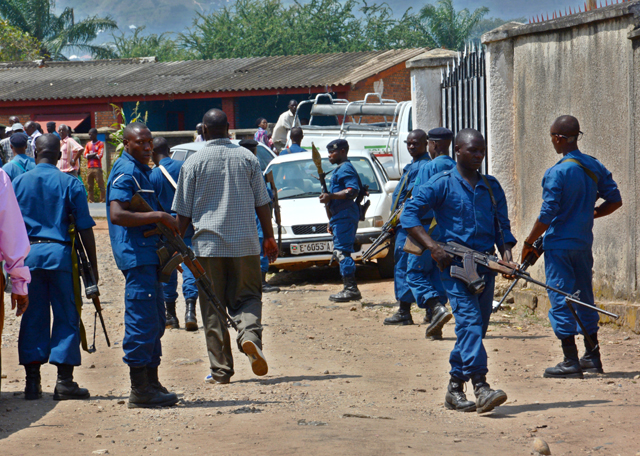
Paris, France | AFP |
Burundi’s brutal regime has set the small central African country on a “descent into hell”, a prominent human rights group said Tuesday, warning of the risk of genocide.
“Since April 2015, when large popular protests broke out against the decision of President Pierre Nkurunziza to seek a third term, Burundi has been in violent political crisis,” the International Federation for Human Rights (FIDH) said.
“We must stop this descent into hell,” said FIDH president Dimitris Christopoulos. “Let us act before it is too late.”
In a 200-page report, the FIDH documented how state-sponsored violence and opposing rebel groups have perpetuated a cycle of violence.
“The crackdown by the security services and the (ruling party’s youth wing) Imbonerakure… aims primarily at retaining power through any and all means,” the report said.
More than 1,000 people have died and up to 800 are missing, said the report titled “Repression and Genocidal Dynamics in Burundi”.
Some 8,000 are being held for political reasons and more than 300,000 people have fled the country, it added.
The FIDH, along with leading Burundian rights group the ITEKA League, spent two years investigating rights abuses in the country.
“All the criteria and conditions for the perpetrating of genocide are in place,” the report said, listing “ideology, intent, security institutions… identifying populations to be eliminated, and the using of historical justifications.”
Burundi suffered a brutal civil war from 1993 until 2006 between majority Hutus and minority Tutsis, which claimed an estimated 300,000 lives.
A failed coup in May 2015 was the “breaking point” after which the authorities adopted a “logic of systematic repression”, the report said.
After Nkurunziza’s re-election in July 2015, the repression deepened, it said, citing targeted killings and massive arbitrary detentions.
In addition, ethnic Hutus in power “have sought to turn a political crisis into an ethnic one, equating ‘opponents’ and ‘rebels’ with Tutsis,” the report warned.
Anschaire Nikoyagize, the now exiled president of the rights group, ITEKA League, said in a statement: “The crimes of the regime have become systematic… Crimes against humanity are occurring and there is a risk of genocide.”
‘Admission of guilt’
Burundian government spokesman Willy Nyamitwe said FIDH was just engaging in “mud slinging and fabricating lies,” adding that “there is no genocide in Burundi and neither any risk of it.
“This is yet another attack on the part of these so-called international organisations in the pay of those who want to destabilise the country,” he said.
Si le ridicule tuait, @fidh_fr serait morte et enterrée. Mais avec ça je pense qu’elle ne se relèvera plus. On ne joue pas avec le #Burundi https://t.co/Meg0NFF0gi
— Willy Nyamitwe (@willynyamitwe) November 15, 2016
Burundi has become increasingly isolated from the international community, notably by withdrawing from the International Criminal Court (ICC).
The move came after ICC prosecutor Fatou Bensouda said she was mulling a full investigation into allegations of murder, torture, rape and forced disappearances — in what Bujumbura described as a “plot to do harm to Burundi”.
The FIDH labelled Burundi’s decision to quit the court as “an admission of guilt” by Nkurunziza’s regime.
The ICC, created in 2002, is often accused of bias against Africa and has struggled with a lack of cooperation, including from the United States, which has signed the court’s treaty but never ratified it.
Two other African countries, South Africa and the Gambia, have followed Burundi’s lead and announced plans to withdraw from the court in recent weeks.
 The Independent Uganda: You get the Truth we Pay the Price
The Independent Uganda: You get the Truth we Pay the Price



